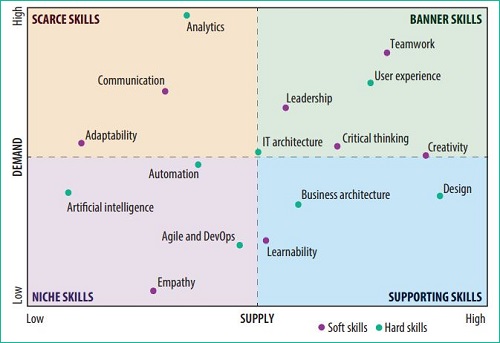How could there be a shortage of tech workers when so many IT professionals are struggling to land an interview, let alone a job?
The answer might be in who exactly businesses are looking to hire.
In its recent Talent Radar report, IT consultancy Infosys examines what it is calling a ‘talent famine’ gripping the tech world.
By surveying thousands of management executives around the world, they found a discrepancy between what businesses want and need, and the workers available.
With Australia requiring an extra 100,000 tech workers by 2024, Infosys’s VP of Australia and NZ, Ashok Mysore, said the ever-shifting technology landscape is making it harder to maintain a viable talent pool.
“Demands around digitisation raise demand for skills, and the skills gap around STEM makes a shortage in the IT industry,” Mysore told Information Age.
“But an expert today can become a novice tomorrow and this is primarily because the hard skills in demand now are those that are necessary for developing digital initiatives with scale.
“The top areas where organisations are focusing on is around understanding the customer, the market, and creating user-centric design.
“Along with customer experience, they also want to know how to use technology to increase productivity or lower costs — these are the focuses of the industry.”

Ashok Mysore
That translates to a need for Australian businesses to find workers who are highly skilled in analytics, UX, architecture, and automation, according to the report.
Often they end up recruiting overseas talent, though an upcoming review of the government’s Skilled Occupation List will hopefully better reflect 21st century work.
However, just because the industry is honing on a specific skillset today does not mean they will always be front and centre in employers’ minds. For example, the type of work being done in building Y2K compliance is no longer needed, even though it was a primary focus for IT departments at the time.
So how do you insure against skill obsolescence?
Along with maintaining an appetite for learning, the Talent Radar report has identified certain interpersonal, non-tech attributes to be particularly important for businesses.
“Developing soft skills are important because they will be with the person in the long term,” Mysore said.
“Gone are the days where the industry is monolithic — one company, one skillset implementing complicated solutions.”
Universities have even begun combining IT with humanities in order to provide students with wide-reaching knowledge bases.
Skills priority and scarcity. Source: Infosys
“What we’re seeing more now is this multidisciplinary, collaborative approach. With that is the culture that prioritises strong learning skills as well as collaboration, teamwork, leadership, and communication,” Mysore said
“These are basic foundations that will stand a person in good stead even when the technology changes so rapidly.
“Remember that people have the capability to learn coding languages in a very rapid cycle and at the same time they have the ability to re-learn new things.”











